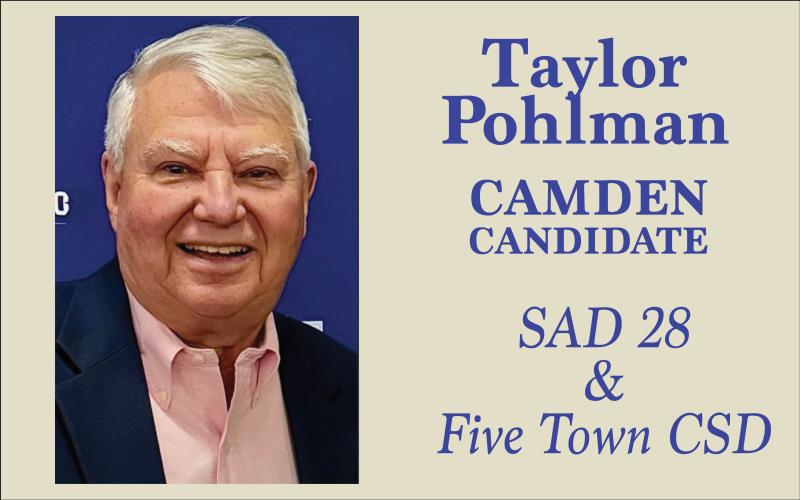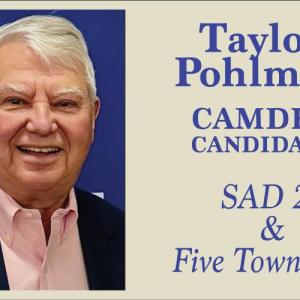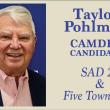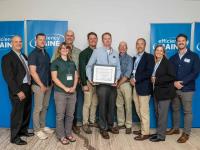SAD 28 and Five Town CSD Board Camden Candidate Taylor Pohlman
On June 10, Camden will vote for two candidates from a field of four candidates to serve on the School Administrative District 28 (Camden-Rockport K-8) and Five Town CSD (Camden Hills Regional High School) school boards.
PenBayPilot.com has circulated questions to Camden school board candidates, who include Rafael (Rafi) Baeza, Rebecca Flanagan, A. Taylor Pohlman and Sarah E. Smith. Here, Taylor Pohlman responds.
Please present a short biography of yourself.
I first moved to the Camden/Rockport area over 30 years ago, and my son graduated from Camden Hills Regional High School. I began my career as a math teacher after graduating from the University of Texas and then moved into high tech.
I had a long career in tech, first in education marketing, then in marketing and technical support. I’ve worked as an executive in some large companies, and also started a software company. I moved here to Maine originally for the environment, and as a great place to raise a child. My decision has been rewarded many times.
To support my family while living in Maine, I became a consultant to tech companies, some of which I had worked for. I now still consult part time, which gave me time to join the School Board three years ago. I wanted to give back to the community and support the school system that did such a fine job for my son.
I currently serve on the boards of the Camden-Rockport schools, the Five Town CSD, and the Midcoast School of Technology and would like to continue those contributions to the community.
What do you hope to accomplish as a public K-12 school board member for your town?
I hope to continue to work for excellence in academics and career opportunities, and increasingly focus on reducing the significant cost of the education we offer.
After several years of inflation-driven costs and some extraordinary capital costs to address maintenance issues, it’s time to take a hard look at our budget, both the process and the line items, and determine ways to slow the growth of costs while maintaining outstanding faculty, facilities and student outcomes.
As a member of the Mid-Coast Technology Board, I would also like to see more improvements in access and utilization of that outstanding facility to make sure that we address the needs and aspirations of all our students.
How do you view the role of public education in the U.S., in Maine, and in Camden and Rockport?
I think public education has the responsibility for developing informed, competent and successful citizens and to make that education available and affordable for all parents. I think the school system’s first responsibility is to prepare students to succeed in whatever career they choose, and to prepare them for the next step, whether it’s High School, College or a work career. At the same time, we owe them, their parents and the community that pays for that education to help them understand the responsibilities of citizenship in this country. I believe that schools need to be ever mindful of what we owe our parents and students, and focus on their needs.
Should pre-K programs be expanded?
I would like to see pre-K programs expanded to the extent it’s financially feasible. Pre-K helps “level the playing field” to ensure that all students are prepared to succeed when they enter the formal school program.
Is the free meal program worthwhile and is there enough local fresh food from area farms being integrated into the meal program?
Our free meal program is important to many in our school system, and ensuring that the food utilizedrepresents healthy choices for our students is critical. I’m happy to see more emphasis on good healthy food as the foundation for overall health. I have been impressed by the competence and devotion exhibited by our staff, both in selecting food and recycling unused food and other supplies. I’d leave it up to them as to the best sources of that food, but I think local food is always desirable, given its freshness, and the low impact of getting it to our schools.
Does the curriculum adequately teach all children and teens about their role in a participatory democracy?
I think we do a good job at the elementary/middle school level of teaching the basic tenets of citizenship, but I do think we could do more at the high school level. For example, the required U.S. history course provides the basics of the development and functioning of our government, but has a large scope to cover in addition to the responsibilities of a good citizen.
There is a good optional semester course that is more directly applicable to the question, titled "Active Citizenship in the 21st Century”. However, it is not required for graduation. Perhaps an expanded scope, including addressing more information about the Constitution, Declaration and our nation’s political history would be helpful. A course like that, perhaps even a required course, would address the very real need for our students to be prepared to vote and participate in local, state and national government.
Our students are subject to many influences, particularly in the media they consume, and I think it’s important for them to have a grounding in civics in order to evaluate what they are hearing and seeing.
Should the subject of personal finance be addressed in all grades?
That’s an intriguing question. As a former math teacher, I remember working with my middle school students on the basics of finance, with the emphasis on evaluating purchases, analyzing bills and invoices, and doing financial calculations. However, the high school math classes I taught were topic-specific: algebra, geometry, etc. I took a personal finance course in college which was an eye-opener, and very valuable to me as I went into the working world. Our high school offers some of these skills in our Applied Academics curriculum, and one course from that curriculum is required for graduation. How specific that course is to a competence in personal finance is worth investigating further.
Do the Camden-Rockport schools need to strengthen the science and technology curriculum. If so, how so?
As faculty and staff of our elementary and middle school will tell you, our science (and STEM in general) curriculum is of particular interest and focus to me. The high school program has always been excellent, and my son had no problem excelling as an electrical engineer in college, given the excellent preparation he had here. I would however, like to see the science program in particular strengthened at the elementary and middle school level, where our district’s test scores in science aren’t as strong as can be found in other leading school districts.
I think the primary issue at this point is the ability to devote enough time to the subject, particularly at the elementary school level, where there are time constraints based on all the education goals that must be achieved.
We, as a Board, are actively looking at the situation and hope to have some recommendations that will improve student performance and ensure that more students are exposed and excited by a strong science curriculum. As someone who at an early stage in my career taught a graduate course in integrating computer technology into classrooms, I know we can do a better job in infusing technology as a support mechanism for many fields of study, and I look forward to making more progress in this area.
What is your opinion of book-banning in public school libraries? Are there any books you want pulled off the school library/classroom shelves?
I am not aware of “book-banning” per se in our schools, but I do think there are age appropriate limits for certain materials, and trust our staff to curate and maintainan appropriate set of materials. What is perfectly appropriate for a high school student who wishes to explore certain topics, whether political, social or sexual, is likely notappropriate for an elementary school student, nor would the parents of many such students want our schools to ignore their wishes in such a regard.
This is an issue that has been politically exploited by many sides in our increasingly noisy discourse, and I look to our professionals to exercise good judgment. While the Board is not involved in library choices, we do have a Curriculum Committee (of which I am a member) that evaluates all textbooks and supplementary materials used in the classroom. I have not seen anything proposed that would trouble me.
Maine’s position on transgender athletes participating in girls sports has resulted in a federal suit against the Maine Dept. of Education. How should the state respond?
I am not sure why the State Government has chosen to risk major school funding over the sports participation issue. The majority of citizens of Maine, and certainly the majority of parents, support transgender students participating in sports, and in the rest of the school experience as well. However, those same groups note that biological advantages and some girl’s life experiences make blanket participation by transgender girls (biological boys) inappropriate and potentially dangerous.
I think our time would be better spent in finding appropriate opportunities for transgender girls to successfully participate in sports without denying other girls the opportunity to fairly compete and feel safe in their environment. At the elementary school level, there are many fewer issues, particularly from a performance standpoint, so i think that is an area where more flexibility is possible. This will, of course, play out in the courts, but in the meantime, the politicians on both sides have brought a lot of unwanted and unfortunate publicity to Maine. I am looking forward to a prompt resolution, and will support the legal outcome, once it is determined.
Should the schools adopt a phone-free policy?
I am in support of a phone-free policy, and note that the High School has just been approved to implement a carefully researched program for that in the Fall. This was a close vote, one of the few highly contested issues to come before the Board in my tenure, but I think it was rightly decided. We looked in particular at the experience of Morse High School in Bath, which has implemented the approach we have chosen. They found many social and educational benefits, and I expect we will see the same. I also expect that the policy may undergo some slight changes, to accommodate some of the issues raised by students and parents, and considered as the Board made the decision.
Camden and Rockport are low-receiver towns, in the eyes of the state, resulting in minimal state funding aid. How will you, as a board member, help reduce the fiscal load on the taxpayer to fund education and maintain the facilities?
We have chosen to fund our schools far beyond the State requirements, and our ability to do that funding, given the tax base in our community, is high. I don’t recommend we pull back from that commitment, and we also have been challenged by significant maintenance on some of our older facilities. However, I do think we can significantly slow the growth of our school budget to something like we had before the COVID era, where increases were in the very low single digits.
We also expect lower enrollments over time, which will reduce the demand for services. Other factors, such as fuel costs, interest rates and building costs, are expected to moderate, but the tariff situation is an unknown, obviously. I can only commit to being the best steward of tax dollars I can, and exploring every avenue to keep costs under control, without risking our educational excellence.
What books are you reading these days, and which do you recommend others read?
I’m reading some non-fiction, in particular Paul Theroux’s Dark Star Safari about his journey overland from Cairo to Cape Town. Fascinating to see how he deals with change and challenge. For fiction, I’m starting in on G K Chesterton’s Father Brown series. I’m a fan of the BBC production, and wanted to get a better feel for the life of the people in the Cotswolds, one of my favorite places on earth (next to Maine, of course). And with all the news about the new Pope, a friend introduced me to Chesterton as an observer of religion as well.
Anything else you’d like to address? Free space!
I have enjoyed my opportunity to serve the people of Camden on the School Board, and wish to continue to contribute. I have no agenda other than the success of all the students in our care. As a former teacher, school administrator and vendor of products and services to schools, I feel I bring a unique perspective to the role.




























